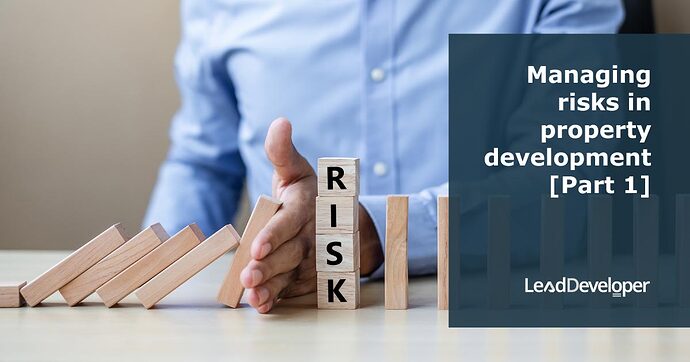Risk Management 01
Here is the critical aspect of risk management in property development, emphasizing its importance for project success.
Risk Management
It’s highlighted as a crucial component of due diligence for property developers. Identifying, measuring, and managing risks before embarking on a project is essential to devise strategies for each potential risk.
Failure Causes
Projects can fail for various reasons such as wrong location, timing, mismatch between product and market, poor cash flow management, and complications during construction. The importance of understanding the property clock and the relationship between market demand and product offering is discussed.
Critical Strategies
Identifying Risks
The necessity of a thorough risk audit, based on experience, checklists, and a systematic approach to property development, is stressed. The process involves analyzing potential risk events critically.
Measuring and Managing Risks
Once risks are identified, measuring their potential impact and managing them through strategic planning is vital. This includes having contingency plans for financing and dealing with unforeseen challenges during construction.
Market and Economic Risks
The video covers various risk types, including economic downturns, taxation changes, and market dynamics like supply and demand. Understanding these factors is crucial for timing the project appropriately.
Development-Specific Risks
Issues such as planning approval, interest rate fluctuations, regulatory changes, and liquidity are discussed. The role of financing in property development is underscored, highlighting the developer’s dependency on financiers once construction commences.
Construction Risks
The challenges of taking over partially completed projects are described, including the difficulty of determining the cost to completion and the reluctance of builders to undertake such projects.
Financial Institutions’ Concerns
Banks’ needs for security and their measures to mitigate risk, such as lowering loan-to-value ratios and requiring additional collateral, are detailed.
Insights based on numbers
- A case study mentioned involved a developer unable to proceed with a project due to poor financial planning, illustrating the importance of cash flow management.
- The discussion includes various risk percentages and financial figures, emphasizing the need for thorough financial analysis and planning in property development.
Frequently Asked Questions
What is the impact of economic downturns on property development?
Economic Slowdown
An economic downturn can directly impact the real estate market, leading to decreased demand for properties. This reduced demand can result in lower property values and can make it challenging for developers to sell their projects at expected prices, thereby affecting the project’s profitability.
Taxation Risk
Changes in taxation policies, such as increases in GST rates or alterations in negative gearing, are also influenced by economic conditions. These changes can affect the cost of development and investment returns, making it essential for developers to stay informed and adapt their strategies accordingly.
Market Sensitivity
The video emphasizes the importance of understanding the property market’s sensitivity to economic fluctuations. Developers must be aware of the timing, recognizing when to launch projects to mitigate risks associated with economic downturns.
Strategic Planning
In response to economic risks, the video advocates for thorough strategic planning, including financial forecasting and market analysis. Developers should prepare for potential economic shifts by incorporating flexibility in their project plans and financial models to withstand market volatility.
What are the strategies for managing construction risks?
Contractor Selection
Choosing the right building contractor is crucial. The video suggests conducting thorough due diligence on potential contractors to ensure they have a solid track record of completing projects on time and within budget. A reliable contractor can significantly reduce construction-related risks.
Bank Involvement
It’s noted that if a bank is involved in financing the project, they usually have systems in place, such as tripartite agreements between the developer, the contractor, and the bank. This setup allows the bank to step in and appoint a new contractor if the original contractor fails to complete the project, thereby providing a safety net.
Contingency Planning
The importance of having contingency plans for unforeseen events during construction is highlighted. This includes allocating a portion of the budget for unexpected costs, ensuring there is flexibility in the project timeline, and having legal agreements that clearly outline responsibilities in case of delays or disputes.
Risk Identification and Management
Developers are encouraged to identify potential construction risks early in the project planning phase. This involves a detailed analysis of the construction process, identifying areas where delays or cost overruns could occur, and developing strategies to manage these risks.
Monitoring and Oversight
Continuous monitoring of the construction process is vital. Regular site visits, meetings with the construction team, and reviews of progress reports help ensure that the project stays on track. Effective communication among all stakeholders is essential to promptly address any issues that arise.
Financial Planning
Understanding the financial aspects of construction, including the costs associated with delays or changes in project scope, is critical. Developers should have a clear understanding of their financial obligations and the potential financial risks involved in the construction phase.These strategies are designed to help property developers navigate the complexities of the construction process, minimizing risks and ensuring that projects are completed successfully.
What is risk management in property development?
Risk management in property development involves identifying, measuring, and managing potential risks before starting a project. This process is crucial for the success of property development projects, as it helps developers devise strategies to mitigate or eliminate risks.
Why is risk management important for property developers?
Risk management is a critical component of due diligence for property developers. It enables them to anticipate and prepare for possible challenges, ensuring that they can navigate obstacles effectively and increase the likelihood of project success.
What are some common causes of failure in property development projects?
Projects can fail due to a variety of reasons, including selecting the wrong location, poor timing, a mismatch between the product and the market, inadequate cash flow management, and complications during construction. Understanding the property clock and aligning market demand with product offerings are also vital for avoiding failure.
How can risks be identified in property development?
Risks can be identified through a thorough risk audit, which should be based on experience, checklists, and a systematic approach to property development. This involves critically analyzing potential risk events that could affect the project.
What does measuring and managing risks entail?
Once risks are identified, it is important to measure their potential impact and manage them through strategic planning. This includes developing contingency plans for financing and addressing unforeseen challenges that may arise during construction.
What are market and economic risks in property development?
Market and economic risks include factors such as economic downturns, changes in taxation, and market dynamics like supply and demand. Understanding these risks is crucial for appropriately timing the project to align with favorable market conditions.
What are development-specific risks?
Development-specific risks involve issues like obtaining planning approval, fluctuations in interest rates, regulatory changes, and liquidity concerns. These risks underscore the importance of financing in property development and highlight the developer’s dependency on financiers once construction begins.
What are construction risks?
Construction risks include the challenges associated with taking over partially completed projects, such as determining the cost to completion and the reluctance of builders to undertake such projects. These risks can significantly affect the project’s timeline and budget.
What concerns do financial institutions have regarding property development?
Financial institutions are concerned with minimizing their risk. They may implement measures such as lowering loan-to-value ratios and requiring additional collateral to secure their interests. These measures reflect banks’ needs for security in lending for property development projects.
How important is financial planning in property development?
Financial planning is extremely important in property development. A case study mentioned highlights the consequences of poor financial planning, where a developer was unable to proceed with a project. Effective cash flow management and thorough financial analysis are essential for the successful completion of property development projects.
Test Your Knowledge
Multiple-Choice Questions on Risk Management in Property Development
1. What is the primary purpose of risk management in property development?
A) To ensure the project is completed as quickly as possible
B) To identify, measure, and manage potential risks before starting a project
C) To guarantee profit margins
D) To comply with government regulations
2. Which of the following is NOT a common cause of failure in property development projects?
A) Excessive budget allocation
B) Mismatch between product and market
C) Poor cash flow management
D) Complications during construction
3. What is emphasized as a crucial initial step in managing risks for property development?
A) Securing loans from multiple banks
B) Identifying risks through a thorough risk audit
C) Starting construction immediately to save time
D) Marketing the finished product
4. Which of the following is a key component in the measurement and management of risks?
A) Ignoring minor risks to focus on major ones
B) Having contingency plans for financing
C) Relying solely on past experiences without planning
D) Avoiding market and economic risk analysis
5. How can market and economic risks affect a property development project?
A) They have no significant impact if the project has begun
B) They can alter the project’s timing due to changes in supply and demand
C) They only affect projects in certain countries
D) They are completely unpredictable and cannot be managed
6. Which aspect is considered a development-specific risk?
A) The weather conditions during construction
B) Changes in interior design trends
C) Interest rate fluctuations
D) The color scheme of the buildings
7. Why is financing highlighted as crucial once construction commences?
A) Because it is the only time developers can secure loans
B) It underscores the developer’s dependency on financiers
C) Construction can proceed without any financing in place
D) Developers tend to have excess funds at this stage
8. What is a major challenge when taking over partially completed projects?
A) Deciding on the project’s name
B) Determining the cost to completion
C) Getting approval for the original architectural designs
D) Changing the construction material suppliers
9. What measures do financial institutions take to mitigate risk in property development?
A) Increasing loan-to-value ratios
B) Requiring less collateral
C) Lowering loan-to-value ratios and requiring additional collateral
D) Offering unlimited funding to all projects
10. The importance of cash flow management is illustrated through:
A) A developer’s ability to start multiple projects simultaneously
B) A case study of a developer unable to proceed with a project
C) The successful completion of projects without any financial planning
D) The use of advanced construction technologies
Assignment
Understanding Risk Management in Property Development
Objective:
This assignment is designed to test your understanding of risk management in the context of property development. You will apply the concepts learned to analyze potential risks, develop strategies for risk management, and understand the intricacies of financial planning and market analysis in property development.
Part 1: Risk Identification and Analysis
To Do:
- Select a hypothetical property development project. Describe the project, including its location, type (residential, commercial, mixed-use, etc.), and scale.
- Identify Potential Risks: Based on the project description, identify at least five potential risks that could impact the project. Use the categories provided in the article (e.g., market and economic risks, development-specific risks, construction risks) as a guide.
Questions:
- For each identified risk, explain why it is a potential threat to your project.
- How would you prioritize these risks in terms of their potential impact on the project?
Part 2: Risk Measurement and Management Strategies
To Do:
- Risk Measurement: Estimate the potential impact of the identified risks on your project. Consider factors such as cost overruns, delays, or market inaccessibility.
- Management Strategies: Propose a management strategy for each identified risk. Your strategy should include both preventive measures and contingency plans.
Questions:
- Which tools or methods would you use to measure the impact of identified risks?
- Discuss how your management strategies align with best practices in risk management.
Part 3: Financial Planning and Market Analysis
To Do:
- Financial Planning: Outline a basic financial plan for your project. Include considerations for cash flow management, financing, and contingency funds.
- Market Analysis: Conduct a basic market analysis for your project. Identify key factors such as demand for the type of property you’re developing, current supply in the market, and economic conditions.
Research Questions:
- What financial figures or ratios would you consider crucial in your financial planning?
- How do market dynamics like supply and demand affect your project timing and financial planning?
Part 4: Reflection
To Do:
Reflect on the Learning: Write a reflection on how this assignment helped you understand the importance of risk management in property development. Include any insights you gained from identifying risks, creating management strategies, and planning financially for your hypothetical project.
Submission Guidelines:
- Compile your answers, strategies, analyses, and reflection into a structured report.
- Include any references you used for market analysis or financial planning.
- Ensure your report is clear, concise, and well-organized.

![Managing risks in property development [Part 1]](https://edge.leaddeveloper.com/uploads/db5494/original/2X/b/b49aeefd35e72011ef6d95de68bba148fb77e9a4.jpeg)

